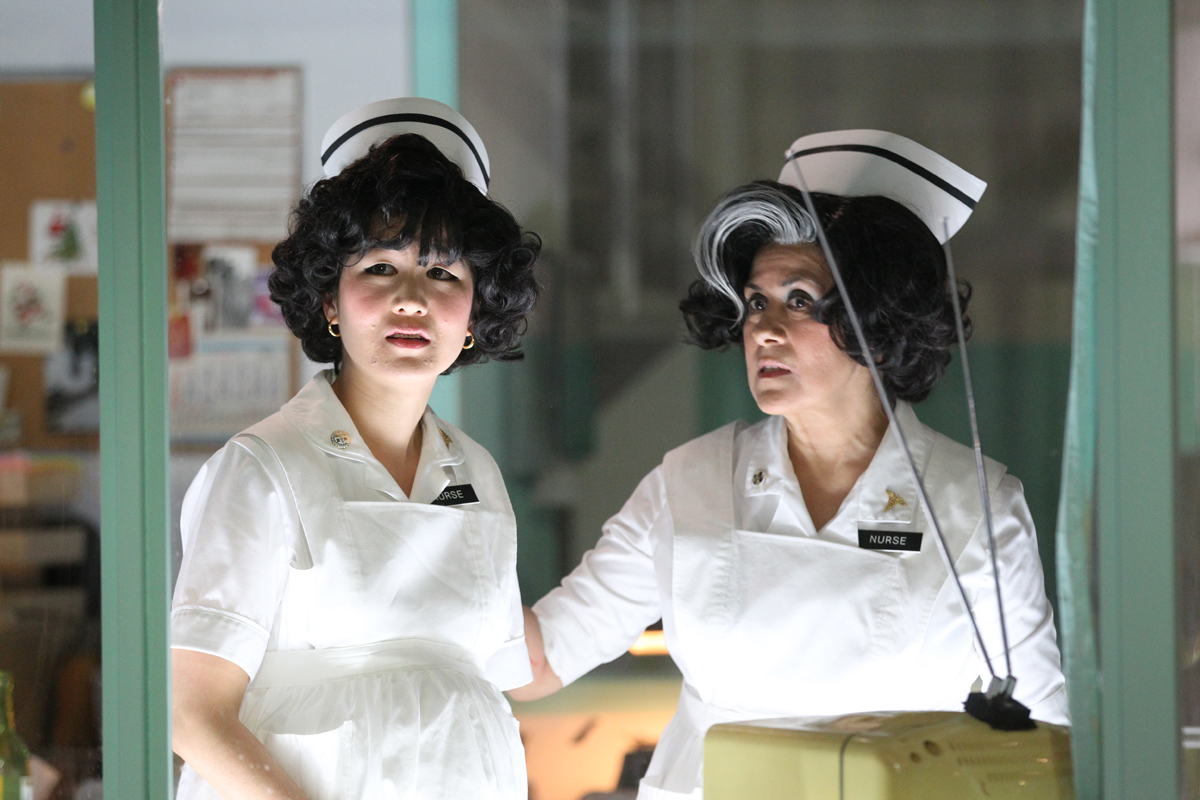Shakespeare’s Macbeth is the story of a Scottish nobleman’s ambition leading to his downfall; the play follows the transformation of a war hero into a murderous villain and traitor, with, to explain such an extreme change, the influence of baleful supernatural forces in the form of three witches, or “weird sisters.” The power of the play derives from the portrayal of evil as an all-consuming, dramatically compelling force in the human psyche. Macbeth’s lucidity—whether speaking to ghosts or encountering phantom daggers or convincing killers to kill, or, in the grand fifth act, going to pieces in a frenzy of resolution and paranoia—keeps us clued into his vantage point as we watch him, like many an historical personage whose reach has exceeded his grasp, put personal gain above public virtue and go down in flames. Eric Ting’s Macbeth 1969, now playing at the Long Wharf, boldly adapts Shakespeare’s text for a new setting—a Veteran’s hospital during the heyday of the U.S. war in Vietnam—and distributes the various parts amongst a cast of three men and three women. Here, Macbeth/Soldier 1 (McKinley Belcher III) is a traumatized soldier returned from war; he visits a severely wounded fellow soldier—Banquo/Soldier 2 (Barret O’Brien)—at the hospital where his own wife (Shirine Babb) is a nurse. The nurses—1/Matron (Socorro Santiago), 2 (Babb), and 3 (Jackie Chung, pregnant and the wife of MacDuff/Civilian (O’Brien)—a draft deserter)—are also the “weird sisters.” It’s an interesting notion to make nurses—who are often both needed and reviled in their service—“witches” to a soldier not quite in his right mind.
Duncan, the benign king Macbeth kills in Shakespeare’s play, is here a wooden politician (George Kulp) who visits the wounded soldier as a campaign stunt and stays to party with the nurses (it’s Christmas), and it’s a compelling idea to imply that a deranged soldier might take it into his head to kill a politician, blaming him for the carnage of the war. Good Soldier 2 finds this treason insupportable, and so Soldier 1 plots to get rid of him too. And for good measure, thanks to dire hallucinations Soldier 1 experiences while undergoing electro-shock, the wife of MacDuff gets put to the sword too. In the end the draft dodger husband returns from exile and offs the culprit. Which I guess suggests that war wins out over other scruples. If there are no atheists in foxholes, there are no pacifists in a fight to the death either.
For Ting’s Macbeth to work, we have to ignore the fact that the text is speaking of thanes and kings and potions and the English army and a moving wood, but, even if we do, that doesn’t mean we’ll enter this new timeframe easily. The show doesn’t recreate the Vietnam War era to me—not even The Archies and The Guess Who on the radio, nor the suggestion that “the insane root” is a joint. What’s more, we have to be willing to indulge oddities: like the “dagger of the mind” speech transposed from preceding the killing of Duncan to preceding the death of Banquo and interlarded with lines about Macbeth’s misgivings about Banquo, or the mad scene of Lady Macbeth witnessed by Nurse 1 and MacDuff, who then learns of his wife’s death from his enemy’s wife. If you know the play well (and I do), it’s best to forget what you know, but there’s a certain amusement that comes from the cut-up quality of the text—so that Nurse 1, before being smothered under a pillow, spouts lines that belong to Malcolm, otherwise not a character in this version.
Mimi Lien’s set is remarkable—it looks and feels like a hospital, and that’s enough right there to estrange one from Shakespeare’s play, so that when Lady Macbeth scrubs the floor rather than her hands (“yet here’s a spot”) it seems perfectly in keeping with the spic-and-span nature of hospitals. Elsewhere incongruity adds entertainment: it’s funny to have Macbeth “spoil the feast”—a tin of hospital food—and to have Banquo “ride” for the hours before dinner in his wheelchair.
In the cast, O’Brien, Chung, and Babbs are best at the naturalized delivery of the lines, making us almost believe at times that we’re hearing normal speech, and Chung—as a drunken expectant mother (it’s the Sixties, y’know)—has some fun with the Porter’s speech. As Macbeth, Belcher is more clueless than conniving, more shrill and anxious than tragic. It seems that Ting, in asking his actors to play the modern setting, lets them fly quickly over lines packed with the play’s actual import—that Macbeth is in fact a tragic figure at war with himself, and not simply a soldier strung out in nightmare hospital.
Macbeth 1969 is earnest in its efforts to make modern warfare and its traumas relevant to Shakespeare’s play, and it partly succeeds, but it’s much less successful at making Shakespeare’s play meaningful in the context of the Vietnam conflict.
Macbeth 1969 A World Premiere Adaptation by Eric Ting The Long Wharf Theatre
January 18-February 12, 2012


